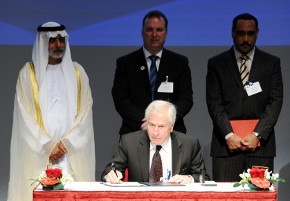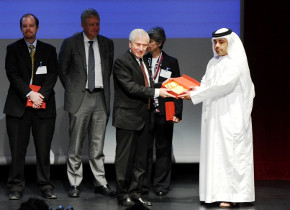UAE-led ‘eFADA’ Project Offers Large e-Resources Collection through Single Platform, Benefiting Faculty and Students Nationwide
 Abu Dhabi-UAE: 04 March, 2013 – Masdar Institute of Science and Technology, an independent, research-driven graduate-level university focused on advanced energy and sustainable technologies, today announced it joined eFADA, a consortium of libraries under the umbrella of Ankabut, the UAE’s Advanced Network for Research and Education.
Abu Dhabi-UAE: 04 March, 2013 – Masdar Institute of Science and Technology, an independent, research-driven graduate-level university focused on advanced energy and sustainable technologies, today announced it joined eFADA, a consortium of libraries under the umbrella of Ankabut, the UAE’s Advanced Network for Research and Education.
A memorandum of understanding (MoU) was signed at a ceremony during the 8th Ankabut Users’ meeting – ‘Discover Ankabut’ – held from 20-21 February at Paris-Sorbonne University Abu Dhabi. Organized under the patronage of His Highness Sheikh Nahyan bin Mubarak Al Nahyan, Minister of Higher Education and Scientific Research, the event was attended by academicians and librarians from several high-profile institutions in the UAE. Dr Fred Moavenzadeh, President, signed the MoU on behalf of Masdar Institute.
Dr Fred Moavenzadeh said: “By signing the MoU, Masdar Institute joins select group of universities that offer this advanced services through sharing electronic resources. The sustainable campus already hosts several pioneering innovations and special features in addition to state-of-the-art laboratory and student facilities. With the support and guidance of the UAE’s leadership, we will continue to provide top-class amenities and we hope joining the eFADA will help us offering even better services.”
 A UAE-led project, eFADA is expected to offer all students and faculty in the country access to large electronic resources collection through a single platform. It aims to deliver a comprehensive development of physical objects among institutions, a repository for archiving and disseminating faculty and research output, as well as a consortium purchasing for e-resources. The eFADA is a new addition to Ankabut services that supports the national goal of developing a knowledge economy, and contributes to achieving Abu Dhabi’s 2030 Vision.
A UAE-led project, eFADA is expected to offer all students and faculty in the country access to large electronic resources collection through a single platform. It aims to deliver a comprehensive development of physical objects among institutions, a repository for archiving and disseminating faculty and research output, as well as a consortium purchasing for e-resources. The eFADA is a new addition to Ankabut services that supports the national goal of developing a knowledge economy, and contributes to achieving Abu Dhabi’s 2030 Vision.
Dr. Abdullah Al Hefeiti, Library Director, Masdar Institute, said: “The MoU will benefit the library at Masdar Institute from sharing the costs of the subscription, consultation, advanced training, , document delivery services, inter-library loan and best practices. We are already offering advanced services through our library portal, network, e-services and overall IT infrastructure. We hope being part of the eFADA platform will further facilitate the research projects of our faculty and students.”
Dr. Mohamed Mekias, Computational Lab Manager and Senior Lecturer, Masdar Institute, participated in a panel discussion titled ‘Opportunities and Challenges in UAE-based HPC research’ that was organized by the University Leadership Council, a platform for academic leaderships to share creative ideas, foster common interests and spearhead new initiatives for innovation and technology transfer in the region. The panel discussed the high performance computation (HPC) needs of the researchers in the region and set the stage for collaboration among the various universities and institutions in this area.
Introducing the audience to the current HPC infrastructure at Masdar Institute and expansion plans for meeting future needs of researchers, Dr. Mohamed Mekias offered examples of some heavy simulations researchers conduct at the sustainable campus.
Dr. Mohamed Mekias said: “The panel engaged the audience to gauge if there is a critical mass for using HPC in the region and analyzed various concrete plans to share the resources for optimal utilization. Some Masdar Institute researchers are already using heavy simulations and we hope other institutions will be encouraged to integrate simulation as part of their research. We hope to use the Ankabut network as a platform for delivering HPC and data visualization services.”
Dr. Tod Laursen, President, Khalifa University, Dr. Fadi Aloul, Associate Professor, Department of Computer Science and Engineering, American University of Sharjah, and Dr. Thomas Burton, Professor and Chair, Department of Aerospace Engineering, Khalifa University, participated in the panel discussions.
On the second day, Dr. Abdullah Al Hefeiti moderated a roundtable session on libraries. Participants discussed key issues facing the UAE librarians including best practices, challenges, and training and development. The session also witnessed presentations from companies such as Serial Solutions, which provides technology solutions to libraries worldwide, and Biomed Central, publishers of 243 open access, online, peer-reviewed journals in Science, Technology and Medicine (STM).
Ankabut interconnects universities with a 10G backbone and 1G access links. Ankabut also provides international connectivity of 155 Mbit/s to its members via Internet2. Organizations within the UAE including higher education, K-12 schools, libraries and museums are eligible to be connected to Ankabut. It enables a closed society network, which allows the transfer of services in real-time such as converged instant messaging, video communication, time-sensitive services such as grid computing linkage (cloud computing), and services that are not completed in real time such as e-learning, e-mail, libraries linkage, off-site disaster recovery and unified single sign registration.